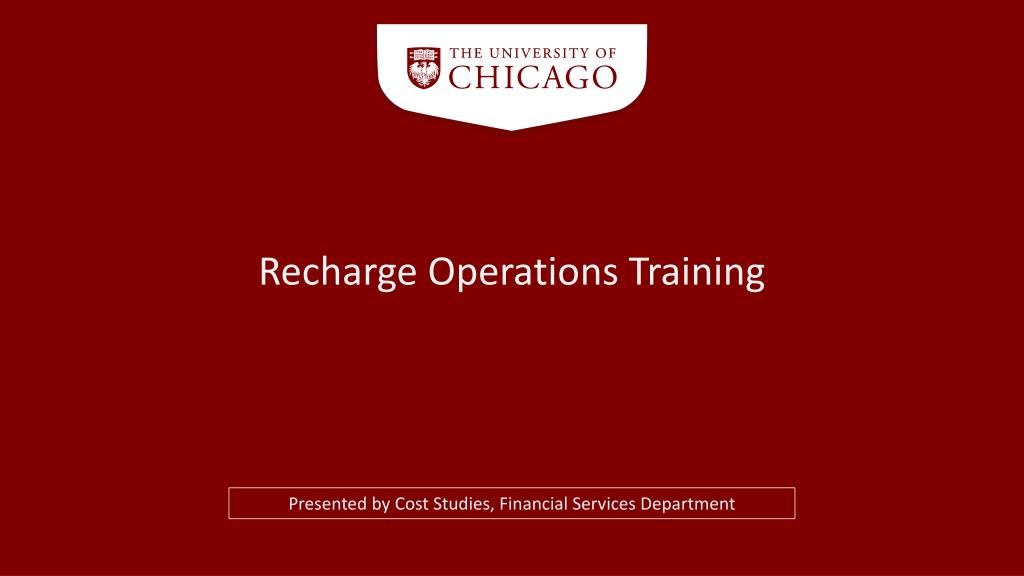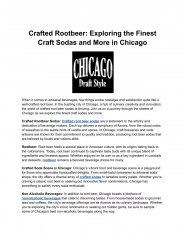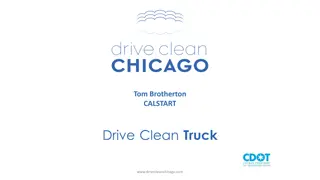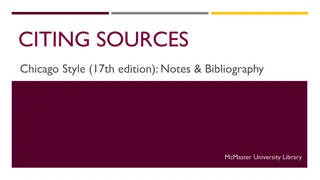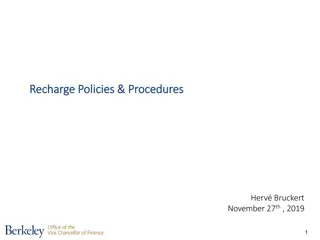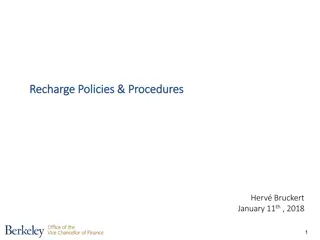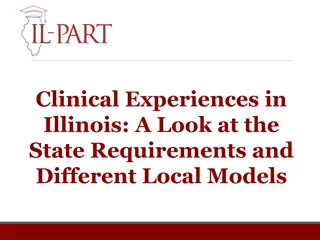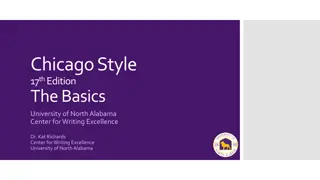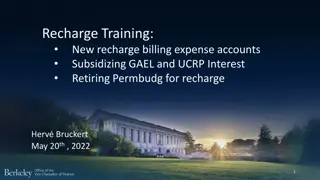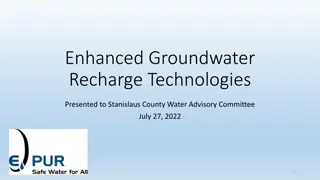Understanding Recharge Operations in Financial Services at the University of Chicago
The Recharge Operations Training presented by the Cost Studies group in the Financial Services Department at the University of Chicago aims to educate participants on basic recharge concepts, policy compliance, rate development, and annual review processes. The responsibility of ensuring recharge compliance lies with the Cost Studies team. Recharge operations, including Recharge Centers, Service Centers, Specialized Service Facilities, and Pass-Through entities, serve the University community by providing goods and services for a fee. Federally allowable expenses must be included in recharge rates to ensure financial sustainability.
Download Presentation

Please find below an Image/Link to download the presentation.
The content on the website is provided AS IS for your information and personal use only. It may not be sold, licensed, or shared on other websites without obtaining consent from the author. Download presentation by click this link. If you encounter any issues during the download, it is possible that the publisher has removed the file from their server.
E N D
Presentation Transcript
Recharge Operations Training Presented by Cost Studies, Financial Services Department
Training Objectives Understand basic recharge concepts and the policies governing recharge activities Develop recharge rates in accordance with campus policy Understand the annual recharge review and approval process at the University of Chicago Understand the guidelines and requirements necessary to successfully manage your recharge activity
The University of Chicagos Recharge compliance function is the responsibility of the Cost Studies group within Accounting and Financial Reporting in the Financial Services Department. It has two staff members that oversee recharge compliance for the campus. Carla Bucci Manager Cost Studies Iesha Holmes Senior Analyst Cost Studies
What is a Recharge Operation? Recharge Operations are shared resources that provide access to instruments, technologies, as well as expert consultation and other services to scientific and clinical investigators, other University personnel and the general public may be served incidentally by the operation. A Recharge Operation charges a fee directly related to the recovery of the goods or services provided and must breakeven over time. In addition, only federally allowable expenses may be included in recharge rates.
There are four types of Recharge Operations Recharge Center: An operating activity established for the primary purpose of providing goods and/or services to a segment of the University community for a fee, typically offered as a convenience to the employees and students of a department/division rather than the entire university community. Annual operating budgets to provide the goods and/or services will normally be less than $100,000. Recharge Centers have annual charges to federal awards of less than $10,000. Copy centers and stockrooms are examples of a Recharge Center. Service Center: An operating activity established for the primary purpose of providing goods and/or services to the University community for a fee, typically intended for University wide consumption and is not departmental/college based. Annual operating budgets to provide the goods and/or services is greater than $100,000. Service Centers have annual charges to federal awards of $10,000 or greater. The Cylinder Gas Shop and the Immunohistochemistry Core are examples of a Service Center. Specialized Service Facility: A Specialized Service Facility (SSF) is defined by Uniform Guidance (see 2 C.F.R. 200.468) as a highly complex or highly specialized facility, whose services are not typically available from an outside vendor. Specialized Service Facilities are designed to include their allocable share of all F&A costs. SSF s are governed by the Recharge Operation policy. There are no Specialized Service Facilities at the University of Chicago at this time. Pass Through: A Pass-through provides goods and/or services to the University community and the charge is equal to the purchase price with no mark up for administrative or other recharge expenses. The Pass-through purchases the goods/services from a vendor and then recharges users. While these operations do not need to submit a questionnaire and annual rate template, they do need to submit an annual Pass-through Confirmation form that confirms that they are still operating as a Pass-through. Dry Ice and Liquid Nitrogen are examples of a Pass-through recharge operation.
Recharges should be established if: Service is not available elsewhere on campus. Service is identifiable as opposed to general. Separate costs and budgets can be clearly defined for these activities. Need for this service is long-term. Service is provided for or subsidized by a federal award. Service will be used by multiple client groups and sources of funds within the University. Volume of service is expected to increase over time. Most of the users will be internal with possible incidental external usage.
Policies that govern Recharge Operations The University of Chicago University Policy 1005 Federal OMB Uniform Administrative Requirements, Cost Principals, and Audit Requirements for Federal Awards (2 C.F.R. 200) ( Uniform Guidance ). Uniform Guidance
Federal Requirements Rates must be based on actual usage of the services. The schedule of rates should be established using a documented method. Rates may not discriminate against federally supported activities of the institution, including usage by the institution for internal purposes. Rates must be designed to recover only the aggregate costs of the services. The costs charged for providing each service generally consists of its direct costs only. Rates shall be reviewed and if required adjusted at least every other year and shall take into consideration any operating deficit or surplus of the previous period(s). Records must be retained and made available to federal officials.
Recharge Operations Roles and Responsibilities
Recharge Financial and Operations Management Ensure that the recharge is Federally compliant per the Recharge Operation Procedure Manual. Perform necessary Accounting functions in support of the recharge(includes preparing journal entries as needed). Prepare and administer the recharge operation budget, maintain adequate records, and accurately invoice customers on a timely basis. Complete the annual recharge rate template(includes determining the proper rate development methodology, preparing a schedule of rates for services/products offered by the recharge to users). Support data requests, audit requests, and other reviews that may occur. Maintain open communication with Financial Services regarding all recharge operational issues.
Division/Department/School Ensure all recharge operations and users comply with recharge-related policies and procedures per the Recharge Operation Procedure Manual. Provide oversight and support to recharge Managers. Facilitate communications to University of Chicago faculty and staff about recharge operation rates and billing issues. Fund deficits that cannot be recovered through the recharge operation rates. Approve all requests for new recharge operations and new recharge account creation.
Financial Services/Cost Studies Ensure compliance with Federal and University policies related to recharge operations. Review and approve recharge center rates, including mid-year rate adjustments. Maintain and update recharge operation policies and procedures, as necessary. Provide rate setting and other recharge related guidance to recharge operations. Review and approve the establishment and closing of recharge operations. Recommend corrective actions to be completed by the recharge operation based on periodic reviews and data verification. Provide assistance to auditors regarding recharge operation issues.
Recharge Operations Rate Calculation Basics
Recharge Rate Calculation The purpose of the Recharge Rate Calculation Template is to provide uniform guidance to University of Chicago recharge operations for calculating and establishing recharge rates. Annual rate calculations are required by Cost Studies. The Recharge Rate Template is due on May 15th each year Approved rates are effective July 1st of each year
Basic Rate Calculation Methodology Salary $8,000 Benefits $2,400 Non-Labor Expense $10,000 Equipment Depreciation $3,125 Total Cost $23,525 Projected Usage(# of hours) 500 Calculated Recharge Rate per Hour $47.05
There are two basic types of rates that a recharge unit uses to generate revenue: Internal External Internal users must be billed at the same approved rate for the same level of services or goods purchased. Internal rates may be equal to or less than the calculated rate. Internal users may not be charged a rate higher than the calculated rate. External users may be charged different rates. External rates can be set higher than the calculated rate. External rates should be set lower than market rates to avoid competition with local businesses providing similar services.
Recharge User Types Internal UChicago Users - This group of users would be academic and staff employees of the University of Chicago that are purchasing recharge services for work done on behalf of the University and have a University funding source/account number. External Academic Affiliated Users(Internal Rate) - This group of users would be users that are not purchasing recharge services as employees of the University of Chicago or on behalf of the University but are affiliated with the University in some way and would be charged the internal rate. External Academic Non-Affiliated Users - This group of users would be users that are not purchasing recharge services as employees of the University of Chicago or on behalf of the University. They are academic users but are not affiliated with the University and would receive the appropriate external rate. External Commercial & Other Users - This group of users would be users that are not purchasing recharge services as employees of the University of Chicago or on behalf of the University. These are non-academic commercial/other users that would generally be charged a higher external rate.
Rate Template Components The Recharge Rate Calculation Template is composed of 12 sections that require some form of data entry: General Information Description of Services Usage Effort & Service Allocations Effort Billable Hours Salary & Fringe Benefit Expenses Non-Labor Expenses Equipment Depreciation Expense SD in Aggregate Rate Calculation Proposal FB Coverage Calc
The Financial data required to complete the rate template will come from various sources: Actuals Projections Accuracy of projections depends on the assumptions used such as: Workday FAS Business Objects Usage Reports Property Management System(PMS) Capital Assets Accounting(CAA) Other Supporting Documentation Knowledge of recharge activity Historical performance Predicted future environment Staffing requirements Non-Labor expense estimates
Recharge Rate Proposal Review Process Financial Services notifies the recharge units that the rate template has been uploaded to the Recharge Operations webpage. Financial Services notifies the recharge unit of rate approval via email. Recharge unit prepares the rate calculation template. Recharge unit answers follow up questions per instructions and returns answers and updated rate template to Financial Services. Recharge unit submits rate calculation template to Financial Services before or by the May 15th deadline. Financial Services sends Recharge Rate Review Form to the recharge unit with follow up questions(if necessary). Financial Services begins reviewing the rate template for completeness, accuracy and adherence to policy.
Document Retention Per University Policy 2708, financial records associated with the Recharge Operation must be maintained for 7 years. This includes: Rate calculation and rate approvals Usage documentation Annual budgets Annual financial statements, if produced Financial backup information including lists of employees, equipment used by the recharge and associated depreciation data. Copies of invoices w/supporting documentation Documentation is important because recharge activities may be subject to audits by the Federal government, internal auditors, external auditors via a Single Audit(formerly A-133 audit) or outside consultants.
Other Resources Recharge Operations Webpage Accounting for Recharge Operations Checklist Recharge Operation Procedure Manual FAS User Manual
The End
